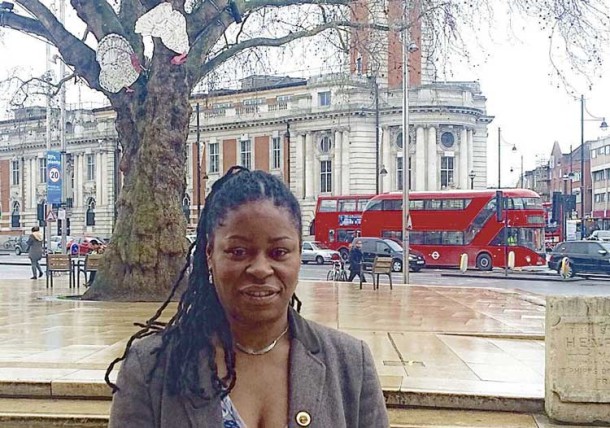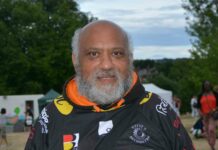Janet Hills, the first female leader of the Metropolitan Black Police Association, has spent 24 years on the force, largely in Brixton. She talked to Kimberley Moyo about new dynamics in policing
Janet Hills joined the police in 1991 during a drive to recruit more black and Asian police officers. She had been a revenue inspector on the buses and took part in fare evasion operations backed by the police. Colleagues who had left to join the police encouraged her, as did her brother, who was also in the force.
She was told: “You’ll change when you join the police. You’ll lose your friends.” But, says Hills: “I was determined, very mindful not to change and to be true to myself. On coming in, I knew there weren’t going to be loads of black people. But it did not stop me. I was not scared or apprehensive.”
Her parents are from Jamaica and she says her cultural background allows her access to communities that do not usually trust the police.
Asked about Home Secretary Theresa May’s statement that there need to be more black and ethnic minority police officers, Hills says: “You can just say that because it looks good! But how are you going to achieve that?
“I know we have the Equalities Act that will allow you to do certain things, but it is very restricted.
“If you couldn’t find at least one black person who wanted to be a police officer, that means you need to work a little harder at your community engagement.”
Asked if a police force that represents a particular community could be effective in establishing a healthy relationship between the community and the police or merely highlight ethnic differences, Hills says: “I would like to call it cultural competency. In London, you have every single colour. It is the most diverse city in the UK. So I do think it is a good idea; it shouldn’t be seen as a negative.”
Hills says the relationship between police and community has improved. “There is still some way to go but, overall, there has been some good improvement to bridge that gap between the police and the community.
“I think that there should be a sort of archive for all police stations that have had a history of community relations that haven’t gone so well. The community will always remember and that gets passed down from generation to generation.”
A combination of factors has brought about the change for the better, says Hills. “The Deputy Mayor for Policing has helped, although it is a political role, because they are the people that hold the police accountable in a lot of things.
“Even though there have been some improvements, stop and search is still contentious. People are still complaining they are stopped disproportionally in comparison to their white counterparts.
“You could have young black men going to university or going to a job who have nothing to do with crime but, because of colour, they are profiled.
“Even though there have been some positives, there is still a bit of a way to go before we get the results we want.”
Hills says crime trends have changed. “In Brixton in the 90s you had a lot more street robberies. Brixton was the number one hotspot for robbery in Europe!”
The transition to her new job with the BPA has been fine, she says. “Bevan Powell (now a councillor in Kensington and Chelsea borough and the former chair of the BPA) told me: ‘You’ll never know the people you will influence’. It is a tough job − you are speaking out against things that are uncomfortable but they are uncomfortable truths.
“You just do your job and do it as best as you can. When you are in the force for 24 years, you do not want to be critiquing to that level but it needs to be done, or things will never change.
The issues faced are the same as ever, she says: “There is trouble in recruiting, trouble in promoting and then there are problems in retaining black officers.
“What I would like to do is to make all the black police associations, nationally, become more consistent about what they are trying to achieve and to have more positive outcomes.
Asked if black police associations could create a “you versus us” culture, Hills says: “The problem is that it is all about the lived experience. What does it feel like to be a black person in London fearing the police will stop or harass you when you step out of your door? How are you able to communicate that to anybody that would care? It is not about divide, it is about understanding.”
Black police associations were formed in 1994, a year after Stephen Lawrence died. “That family were treated differently and things that should have been done were not done. It is not right that we should be treated differently, we should be treated equally. We are needed so that our communities have access and so that people journeying into the profession do not find it so challenging.”
Hills welcomes the growing number of women joining the police. “It is still male dominated, but there are loads of women coming in and this is brilliant! Women are doing relatively well in this aspect. Gender is doing better than black and ethnic minorities when we consider diversity.”
Looking to the future, Hills acknowledges the high profile problems of places like Angell Town estate, but says the Brixton she knew in 1991 has changed.
“Those areas that people talk about exist. But the only way you are going to combat the problems is through community relations and for the police to be more proactive and to ensure the voices of people on estates are heard.
“What is needed is accessibility on the ground. It is about everybody working together so that people get the very best in terms of community satisfaction and objectives being met in how the area is policed.”




